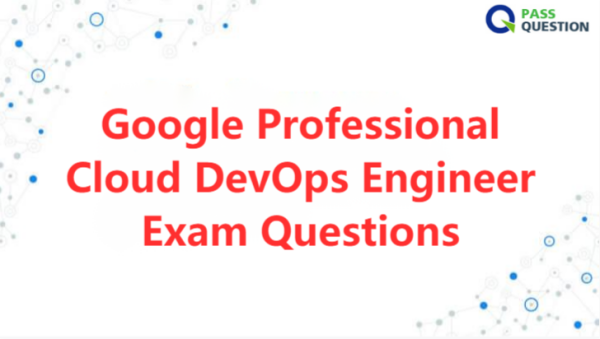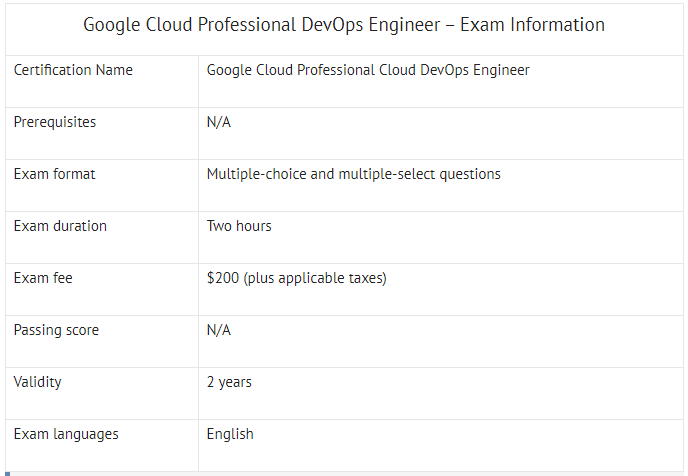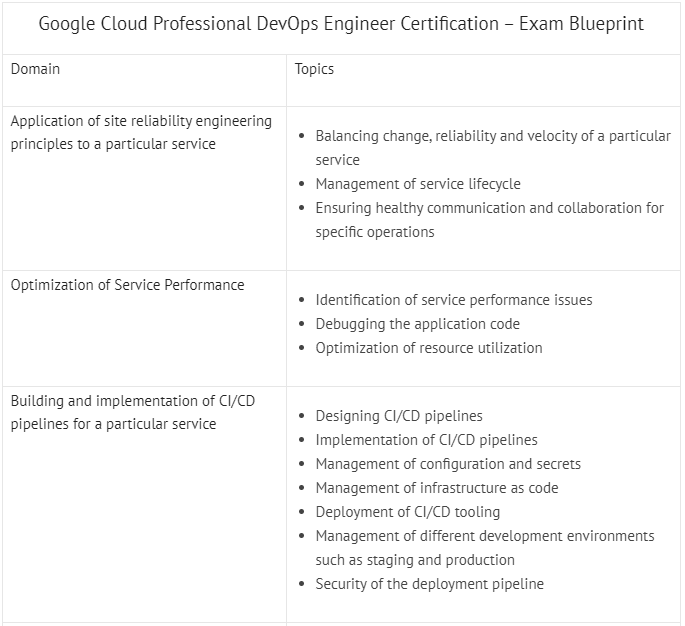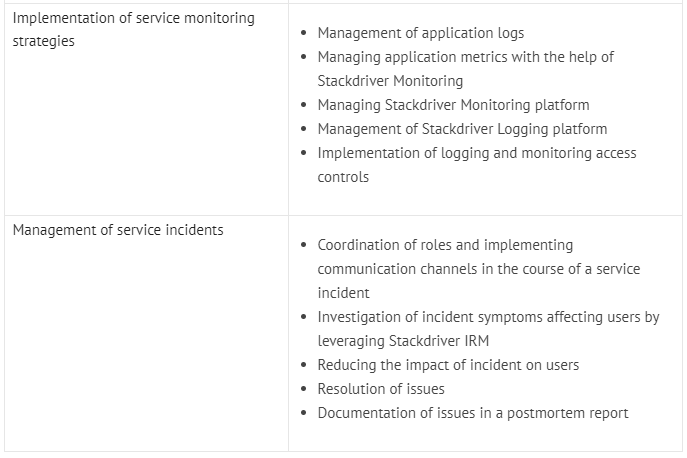Google Professional Cloud DevOps Engineer Exam Questions
Google Professional Cloud DevOps Engineer certification is greatly recommended for its applications in analytics, machine learning, and cloud-native.PassQuestion Google Professional Cloud DevOps Engineer Exam Questions provide you with comprehensive guidelines for achieving the good results in the Google Professional Cloud DevOps Engineer exam. Google Professional Cloud DevOps Engineer Exam Questions enable you to to prepare your exam and pass the Google Cloud Certified - Professional Cloud DevOps Engineer Exam in the first try.

Professional Cloud DevOps Engineer Exam
A Professional Cloud DevOps Engineer is responsible for efficient development operations that can balance service reliability and delivery speed. They are skilled at using Google Cloud Platform to build software delivery pipelines, deploy and monitor services, and manage and learn from incidents.
The chief perspective of the Google Professional Cloud Devops Engineer (GCP) Exam is to screen the calibre and proficiency of professionals in applying the tactics of the cloud platform. Candidates are screened in handling the responsibility in the efficient development of operations, and to balance service reliability and delivery speed. Candidates should ace at the application of Google Cloud Platform in building software delivery pipelines, deploying and monitoring services, and managing and learning from incidents.
The Professional Cloud DevOps Engineer Exam is primarily designed for these professionals –
On-premises IT system administrators
Cloud solution architects and application developers
DevOps professionals with industry experience
Aspiring DevOps professionals with limited GCP experience
On-premise system engineers
Professional Cloud DevOps Engineer Exam Information
The Professional Cloud DevOps Engineer will comprise of around 102 multiple-choice, and multiple select questions. Candidates will be assessed on the basis of these questions. As far as the exam duration is concerned, this exam will be for a duration of 4 hours. An application fee of $200 (plus tax where applicable) is to be paid to take the exam.

Professional Cloud DevOps Engineer exam Objectives
Go through the following table to find the subtopics in each domain of the Google cloud DevOps engineer certification exam.


View Online Professional Cloud DevOps Engineer Free Questions
You manage an application that is writing logs to Stackdriver Logging. You need to give some team members the ability to export logs. What should you do?
A. Grant the team members the IAM role of logging.configWriter on Cloud IAM.
B. Configure Access Context Manager to allow only these members to export logs.
C. Create and grant a custom IAM role with the permissions logging.sinks.list and logging.sink.get.
D. Create an Organizational Policy in Cloud IAM to allow only these members to create log exports.
Answer: A
You support the backend of a mobile phone game that runs on a Google Kubernetes Engine (GKE) cluster. The application is serving HTTP requests from users. You need to implement a solution that will reduce the network cost. What should you do?
A. Configure the VPC as a Shared VPC Host project.
B. Configure your network services on the Standard Tier.
C. Configure your Kubernetes cluster as a Private Cluster.
D. Configure a Google Cloud HTTP Load Balancer as Ingress.
Answer: A
Your team has recently deployed an NGINX-based application into Google Kubernetes Engine (GKE) and has exposed it to the public via an HTTP Google Cloud Load Balancer (GCLB) ingress. You want to scale the deployment of the application's frontend using an appropriate Service Level Indicator (SLI).
What should you do?
A. Configure the horizontal pod autoscaler to use the average response time from the Liveness and Readiness probes.
B. Configure the vertical pod autoscaler in GKE and enable the cluster autoscaler to scale the cluster as pods expand.
C. Install the Stackdriver custom metrics adapter and configure a horizontal pod autoscaler to use the number of requests provided by the GCLB.
D. Expose the NGINX stats endpoint and configure the horizontal pod autoscaler to use the request metrics exposed by the NGINX deployment.
Answer: D
Your company follows Site Reliability Engineering practices. You are the Incident Commander for a new. customer-impacting incident. You need to immediately assign two incident management roles to assist you in an effective incident response. What roles should you assign? Choose 2 answers
A. Operations Lead
B. Engineering Lead
C. Communications Lead
D. Customer Impact Assessor
E. External Customer Communications Lead
Answer: AD
Comments
Post a Comment